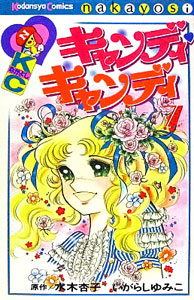Candy Candy
Candy Candy is a Japanese manga and anime series that has garnered a significant following around the world. The story is set in the early 20th century and revolves around an orphan girl named Candice "Candy" White Ardlay. The series explores themes of love, hope, and the challenges of growing up. It was first published in 1975 in the magazine Nakayoshi, created by writer Kyoko Mizuki and artist Yumiko Igarashi. Candy Candy has been adapted into an anime series, novels, and even a musical, making it a significant part of the Japanese pop culture landscape.
Plot[edit | edit source]
The narrative of Candy Candy follows the life of Candy, who grows up in an orphanage in the United States. Her life takes numerous turns as she meets friends, foes, and two significant love interests - Anthony Brown and Terry Grandchester. The story is a rollercoaster of emotions, depicting Candy's journey from a cheerful orphan to a mature and compassionate young woman. Her adventures, misfortunes, and the relationships she forms along the way constitute the core of the story.
Characters[edit | edit source]
- Candice "Candy" White Ardlay: The protagonist, known for her optimistic attitude and kind heart.
- Anthony Brown: Candy's first love, who shares a deep connection with her but meets a tragic fate.
- Terry Grandchester: A rebellious and talented actor, who becomes Candy's second love interest.
- Annie Brighton: Candy's best friend from the orphanage, who later gets adopted.
- Miss Pony and Sister Mary: The caretakers of the orphanage, who provide guidance and support to Candy.
Media[edit | edit source]
Manga[edit | edit source]
The Candy Candy manga was serialized in Nakayoshi from 1975 to 1979. It was collected into nine volumes, which were later reprinted due to its popularity. The manga is noted for its detailed artwork and emotional storytelling.
Anime[edit | edit source]
The anime adaptation of Candy Candy aired from 1976 to 1979, spanning 115 episodes. It closely follows the manga's storyline, bringing the characters and their adventures to life. The anime was particularly popular in Japan and several other countries, including Italy, France, and Latin America.
Novels[edit | edit source]
Kyoko Mizuki also adapted the story into a series of novels, providing a deeper insight into the characters' thoughts and backgrounds.
Themes[edit | edit source]
Candy Candy explores various themes, including love, loss, resilience, and the search for happiness. The series is a coming-of-age story that resonates with audiences due to its emotional depth and the universal challenges it portrays.
Legacy[edit | edit source]
The series has left a lasting impact on the genre of shojo manga (manga aimed at young girls) and continues to be celebrated for its storytelling and character development. Despite legal disputes between the author and the artist over copyright issues, Candy Candy remains a beloved classic in manga and anime history.
Controversies[edit | edit source]
The series has been subject to copyright disputes between Kyoko Mizuki and Yumiko Igarashi, which have affected the re-release and distribution of the manga and anime outside Japan. These legal battles have also hindered the production of new Candy Candy merchandise and adaptations.
Search WikiMD
Ad.Tired of being Overweight? Try W8MD's physician weight loss program.
Semaglutide (Ozempic / Wegovy and Tirzepatide (Mounjaro / Zepbound) available.
Advertise on WikiMD
|
WikiMD's Wellness Encyclopedia |
| Let Food Be Thy Medicine Medicine Thy Food - Hippocrates |
Translate this page: - East Asian
中文,
日本,
한국어,
South Asian
हिन्दी,
தமிழ்,
తెలుగు,
Urdu,
ಕನ್ನಡ,
Southeast Asian
Indonesian,
Vietnamese,
Thai,
မြန်မာဘာသာ,
বাংলা
European
español,
Deutsch,
français,
Greek,
português do Brasil,
polski,
română,
русский,
Nederlands,
norsk,
svenska,
suomi,
Italian
Middle Eastern & African
عربى,
Turkish,
Persian,
Hebrew,
Afrikaans,
isiZulu,
Kiswahili,
Other
Bulgarian,
Hungarian,
Czech,
Swedish,
മലയാളം,
मराठी,
ਪੰਜਾਬੀ,
ગુજરાતી,
Portuguese,
Ukrainian
Medical Disclaimer: WikiMD is not a substitute for professional medical advice. The information on WikiMD is provided as an information resource only, may be incorrect, outdated or misleading, and is not to be used or relied on for any diagnostic or treatment purposes. Please consult your health care provider before making any healthcare decisions or for guidance about a specific medical condition. WikiMD expressly disclaims responsibility, and shall have no liability, for any damages, loss, injury, or liability whatsoever suffered as a result of your reliance on the information contained in this site. By visiting this site you agree to the foregoing terms and conditions, which may from time to time be changed or supplemented by WikiMD. If you do not agree to the foregoing terms and conditions, you should not enter or use this site. See full disclaimer.
Credits:Most images are courtesy of Wikimedia commons, and templates Wikipedia, licensed under CC BY SA or similar.
Contributors: Prab R. Tumpati, MD

